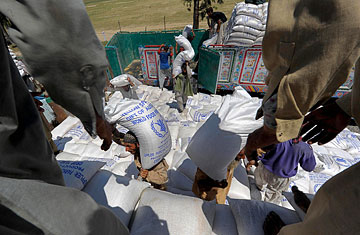
Pakistani workers unload sacks of wheat provided by the World Food Program to be distributed among displaced civilians on May 18, 2009
It's late morning and Minara Khatoon's five young children haven't eaten yet. They sit huddled on the dirt floor of their mud thatch hut, waiting as their mother stokes a makeshift fire with straw and dry leaves to prepare what will be their main — and perhaps their only — meal of the day. Minara has just returned to her home in the riverside village of Kapasia, 192 kilometers north of Bangladesh's capital, Dhaka, with a monthly supply of wheat grain given to destitute rural families like hers by the United Nations' World Food Program (WFP). The food aid helps, but only lasts Minara's landless peasant family —among the poorest of the poor in what is already Bangladesh's most impoverished district — for 20 days. Her husband doesn't work due to a chronic asthma condition so to make ends meet she toils as a maid in wealthier households during the day and at night cobbles together handicrafts to sell in a local market. "This is how we survive," says Minara, pounding fistfuls of wheat on an earthen plate, her tired face far older than that of a woman of her 30 years.
But she may soon have to find a way to do more. While many world leaders claim the worst has past, the fallout of the global financial crisis still hovers over Minara's rural hamlet. In 2009, rich western governments have kept a tighter grip on their purse strings, leading to significant funding shortfalls for international organizations dependent on government contributions. The WFP, which currently targets 108 million people on the brink of starvation in 74 countries and is entirely funded through donation, has been one of the worst affected: At the beginning of the year, it tabled a 2009 budget of $6.7 billion. By September, it had received a little more than a third of what it solicited.
In a year when an estimated 100 million more people joined the ranks of the global hungry, pushing the total over a billion for the first time, the WFP is facing the prospect of scaling back operations and cutting off millions of people it has been providing for. "We're looking at an unprecedented situation," says Gregory Barrow, a WFP spokesman at the organization's headquarters in Rome. "We're having to make extremely difficult calculations that involve real people, real lives."
In Bangladesh alone, a country where an estimated 65 million people can't meet their basic nutritional needs due to high food prices, the ravages of natural disasters and a fall in remittances from laborers abroad, the WFP will be able to reach only 1.4 million of the 5 million people it believes warrant emergency relief. Elsewhere, the picture is no less bleak. A severe drought in Kenya has left some 4 million in need of urgent assistance, but the WFP reckons it will have to reduce rations in October rather than ramping up its presence on the ground to meet the crisis. A drought in Guatemala affecting over 3 million people has been dubbed a "state of public calamity" by the Central American nation's president. But the WFP will have to suspend one of its most vital services there next month — the delivery of a nutrient-enriched cereal to some 100,000 malnourished children under the age of five and 50,000 pregnant or breastfeeding women. Other project cuts are taking their toll in dozens of countries from Cambodia to Madagascar.
The WFP rarely amasses the entire annual sum it requests, but this year's shortfall has been particularly acute. Even when grappling with the onset of recession in 2008, the U.S. donated $2.1 billion. This year, it has given around half that sum. "It's a challenging period for the agency. There's a mood of frustration and anxiety," says the WFP's Barrow. He says they remain hopeful that top-level negotiations with donor governments may yield an injection of cash down the road, but many elsewhere in the aid community have expressed disappointment with western governments for allowing the situation to deteriorate to the extent that it has. "Wealthy countries are spending trillions of dollars on bailing out banks," says Stanley So, a spokesman for the international NGO Oxfam's Hong Kong office. "[They] should not plead tight budgets as an excuse for failing to assist poor people."
In Kapasia, village headmen and local officials must prepare for what could be a looming catastrophe. Many of the four million Bangladeshi WFP aid recipients now in jeopardy are women like Minara whose households were part of the organization's campaign to provide basic staples for families with little or no income. "We need to continue until these poor people are able to stand on their own," says Suman Baroud, a WFP official in the district. "It will be a disaster if we stop." Minara and her neighbor, Rezina Begum, whose husband is an invalid, are still receiving grain handouts, but these may end by next year. Begum speaks plainly of the consequences for herself and her family. "We will simply starve and die," she says.
— With reporting by Farid Hossain / Kapasia, Bangladesh
